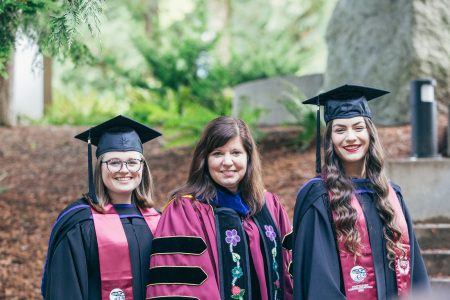At the heart of the First Nations and Indigenous Studies major is FNIS 400, the research practicum. Each year FNIS invites more than 100 Indigenous organizations to identify research needs that a student might address. Students meet with organizations and work to negotiate, design, and implement a project that will address the organization’s needs. Students routinely identify the Research Practicum as the most meaningful experience of their undergraduate careers, a place where theory and practice coincide, bringing the university and community together to accomplish work of lasting value.
We are currently working to prepare the 2024 winter practicum session. We will continue to update this page as more information becomes available, please contact fnis.practicum@ubc.ca with any questions or if you have a project proposal you would like to discuss.

November 2017 FNIS graduates Heather James and Danielle Kraichy with Dr. Sheryl Lightfoot. Photo by Dylan Hamm.
 Faculty of Art
Faculty of Art